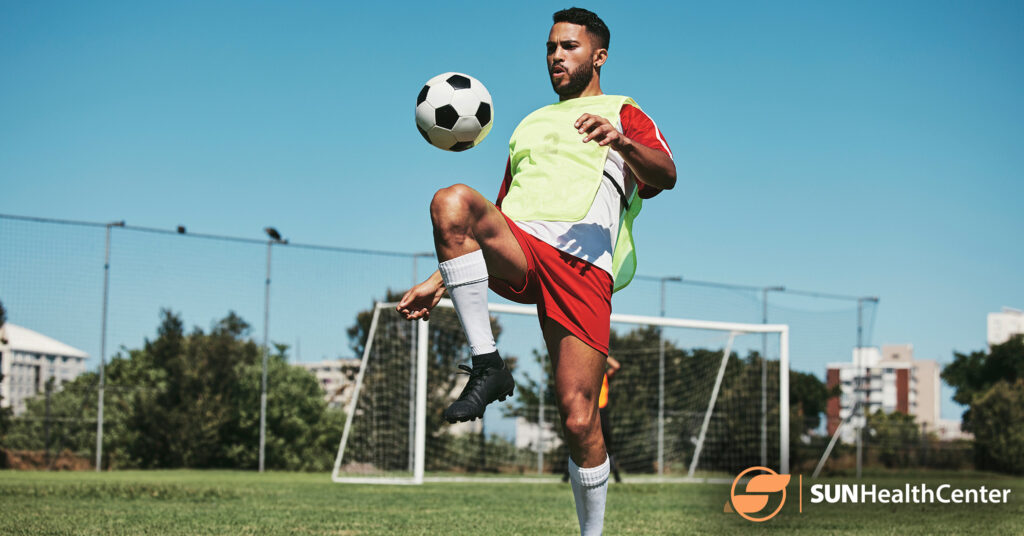
Nearly one-third of Americans will experience anxiety at some point in their lives, according to the National Institute of Mental Health. Athletes in particular may face anxiety as a game or match approaches.
A 2019 study published in Frontiers in Psychology investigated the impact of performance anxiety in sports, where researchers found that 30%–60% of athletes experience symptoms at some point in their career. This pervasiveness makes it important to understand the causes of performance anxiety and effective strategies to combat it. Learn more about identifying and managing performance anxiety to build confidence on the field or court.
Performance Anxiety in Sports: Physical and Psychological Symptoms
Before you learn about overcoming sports performance anxiety, it’s important to understand the symptoms and causes. Performance anxiety can manifest in many ways. Physical signs include an increased heart rate, sweating, trembling and feeling breathless or weak and tired. Your muscles might feel tense, or you might get a headache before a big game. You may even have digestion issues or feel nauseous. These physical symptoms can impact your performance or diminish your confidence as the game approaches.
However, sports performance anxiety symptoms extend beyond the physical signs. Psychological factors also play a significant role in anxiety and can have a detrimental impact on an athlete’s ability to perform. Athletes dealing with performance anxiety might start overthinking and questioning their ability to succeed. Those skills you’ve relied on throughout your life might suddenly seem unattainable, which can affect your self-confidence.
Other psychological symptoms are connected to sports performance anxiety as well. Athletes who are struggling with anxiety might not be able to focus on the game — instead, they’ll be worried about their performance and what teammates, coaches and fans think of them. Additionally, many athletes with performance anxiety face a fear of failure, which can impact how well they play.
Anxiety symptoms are different for everyone, and every athlete’s experience is unique. But if any of these symptoms arise as a game approaches, it’s likely you’re dealing with some degree of performance anxiety.
Strategies for Sports Anxiety Management
Even though the signs of performance anxiety in sports can feel overwhelming, there’s good news. Many effective strategies can assist with athletic anxiety reduction, allowing you to regain your focus and excel in your next game. Check out these tips for sports anxiety management.
1. Try Some Relaxation Techniques
Breathing exercises are a simple and effective way to calm an anxious mind. Before a big game, find a quiet, calm space free of distractions to engage in slow, deep breathing. If you’re feeling overwhelmed, this quick trick can help reduce stress.
2. Prepare and Practice
The more prepared you are for a game, the more confident you’ll be in your performance. So, focus on practicing in the days and weeks leading up to the big event. Make sure you get a good stretch and warm-up in on the day of the game, match or race. When you do, you’ll go in with confidence, knowing you’ve done everything you can to prepare for success.
3. Live a Healthy Lifestyle
Healthy eating prepares your body to excel on the field or court. Eat a balanced diet rich in fruits, vegetables and whole grains to fuel your body. Limit excess sugar or caffeine on the day of the game, as these can amp up your anxious feelings. Make sure you’ve eaten a well-rounded meal in the hours leading up to the game so you’re properly nourished. Good nutrition can combat anxiety symptoms and give you plenty of game day fuel.
4. Connect With Teammates
Whether you play a team sport or you’re running alongside fellow athletes, take the time to connect with others. Talking with your teammates or competitors before the event can shift your focus, allowing you to think about something other than your anxiety. You can even visit family or friends in the stands to boost your mood. Laughing and smiling with others can calm you and improve your outlook as the event approaches.
Mental Preparation for Reducing Anxiety
Since psychological factors play a major role in performance anxiety, identifying ways to calm your mind and enhance your focus is essential. Consider these tips to mentally prepare for your next game.
1. Visualize Success
A positive mindset can help you stay focused on the field or court. Rather than focusing on the negative, visualize your success before the game. Imagine yourself scoring the winning goal or making it to the finish line first. Seeing yourself succeed in your mind’s eye can convince you that it’s achievable, filling you with confidence.
2. Focus on Your Love of the Sport
It’s easy to dwell on negative thoughts when you’re feeling anxious. So it’s important to stay positive when anxious feelings arise. You’re playing this sport for a reason, so remind yourself why you love it. List the reasons you love the sport in your head: your friendships with teammates, the thrill of a win or the physical push it gives you. Enter each game in a good frame of mind.
3. Practice Mindfulness
Mindfulness is an effective way to combat performance anxiety in sports. According to the Pew Research Center, about 40% of American adults practice mindfulness once a week. Mindfulness is the practice of being present and fully aware, focused on what you’re doing and not reacting or feeling overwhelmed by the situation. Mindfulness techniques include sitting down and focusing on your body’s sensations while deep breathing. You can also set daily intentions, which may include a plan for managing your anxiety.
Reach Your Full Potential and Overcome Performance Anxiety
With these proven strategies, performance anxiety in sports can be a thing of the past. Build your confidence, regain your focus and ease the physical and psychological symptoms of anxiety. If you need help managing your symptoms, contact Sun Health Center — we can help you manage your stress and improve your performance.
